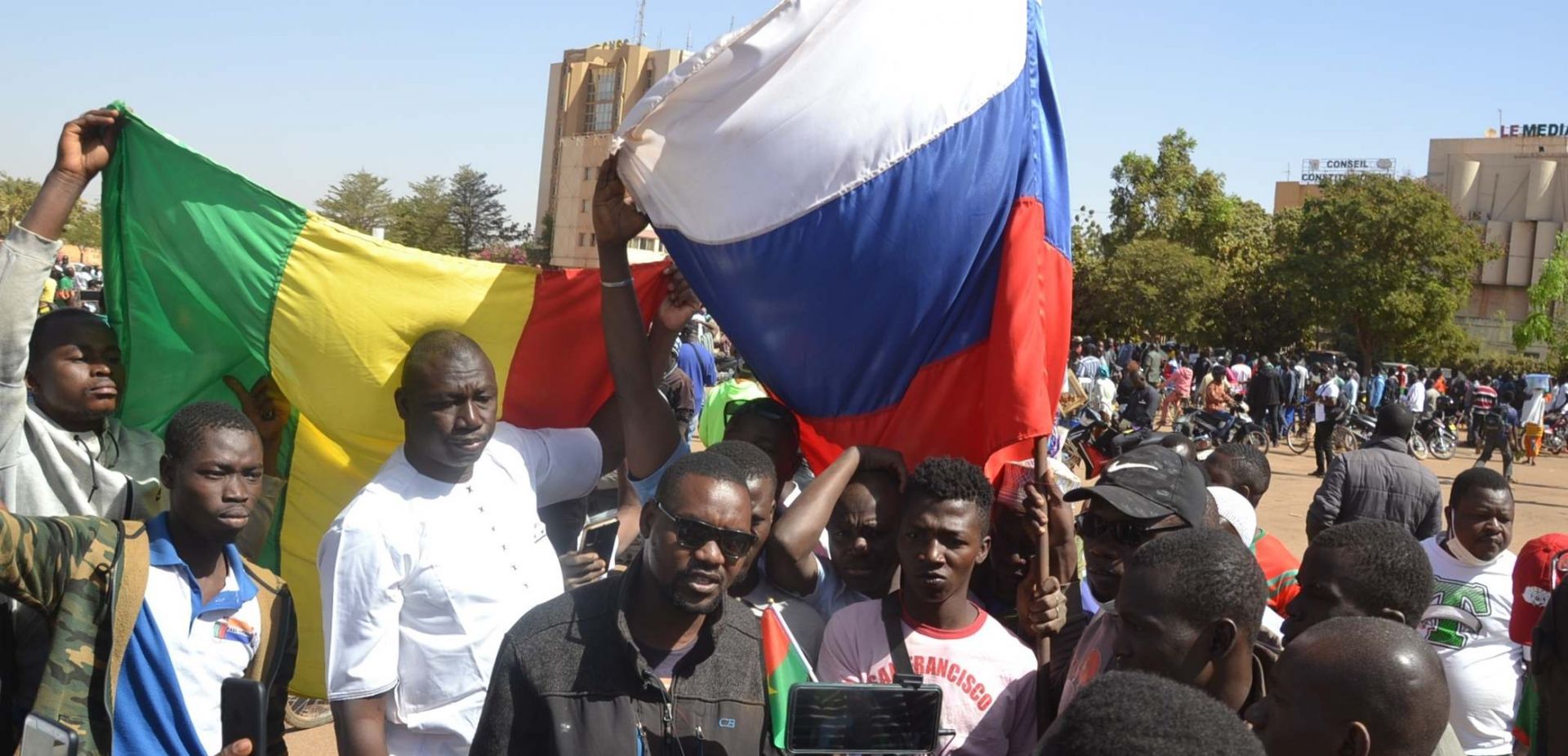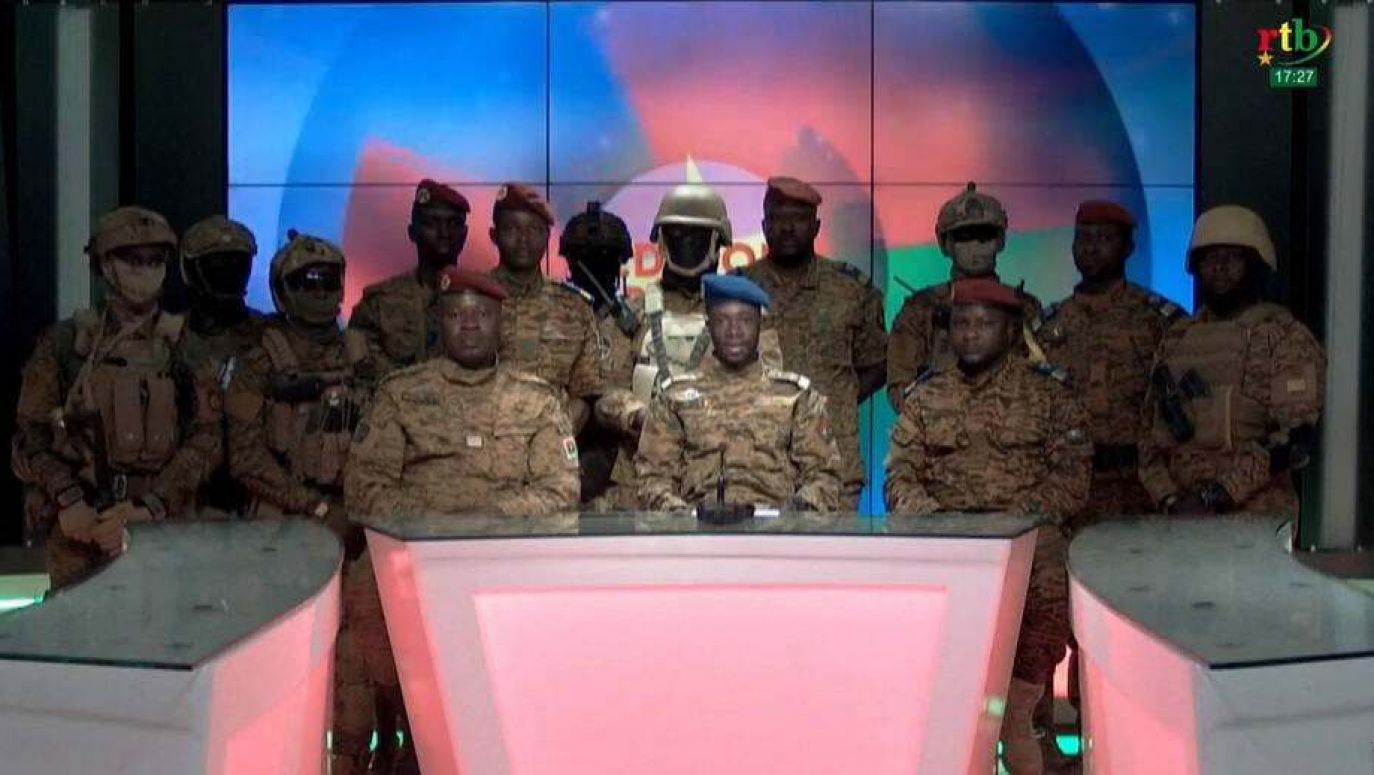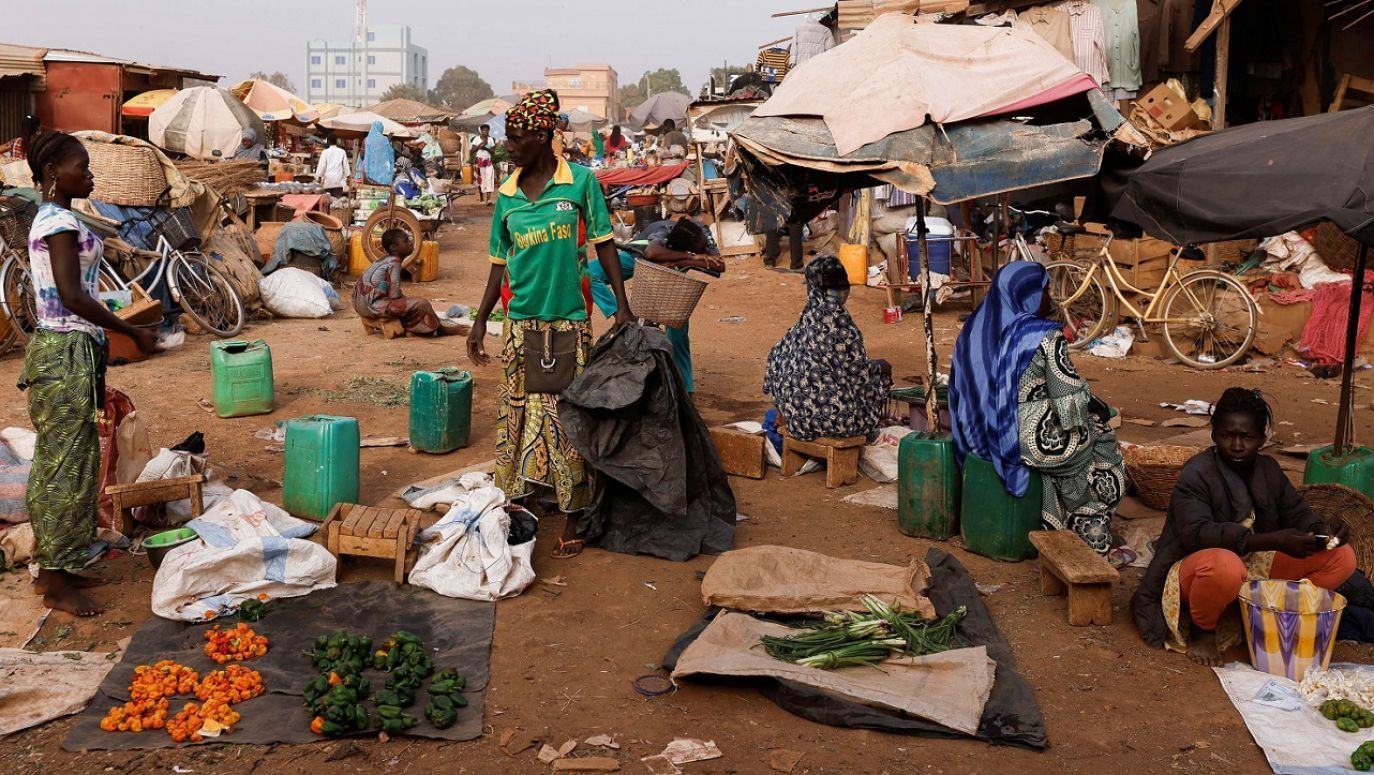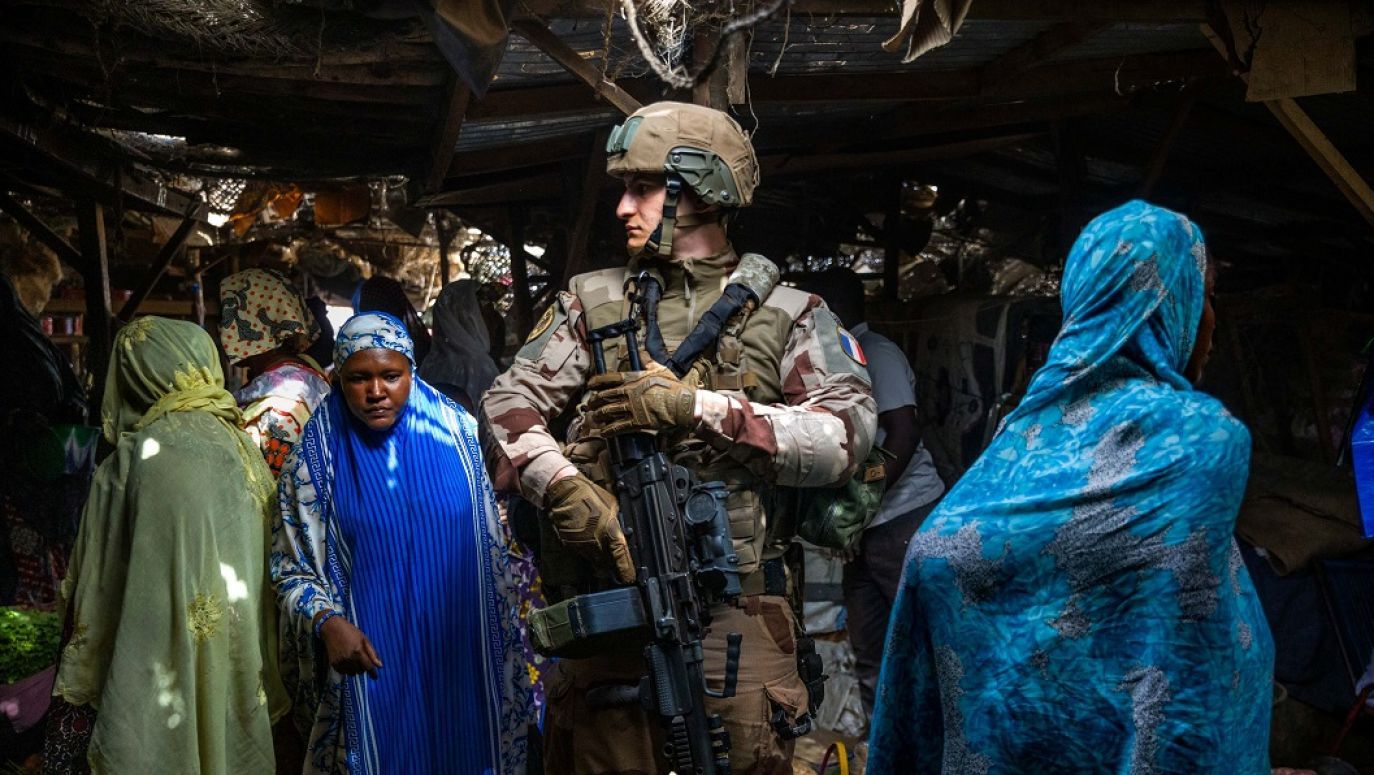An epidemic of coups. Russia thinks back on Africa
08.03.2022
All the pieces fit together. The resentment towards France and the rejection of aid from EU countries are coinciding with growing sympathies towards Russia, which is already muscling into more countries. Perhaps Moscow no longer wishes to passively watch the Sino-American rivalry in the Dark Continent.
Ouagadougou, the capital of Burkina Faso. A crowd of people are standing around a large, rather luxurious car: the body is riddled with bullet holes, the windows are smashed, there is blood on the seats. Everyone is holding smartphones in their outstretched hands and capturing the view.
This is not a scene from a thriller, but recent events in Burkina Faso. The military has seized power in the country. Nobody knows where the president is, there are protests in the streets and Russian flags flying.
The coupists are in power
Coups d'état have been taking place in Africa for some time now, but in the last year and a half there have been six coups in the Sahel alone. It began in Mali, then Chad, Mali again, Guinea, Sudan and recently Burkina Faso.
In August 2020, the military in Mali took advantage of social discontent following parliamentary elections that some citizens considered to be fraudulent. The junta then arrested the president and forced him to resign.
In Chad, in April 2021, President Idriss Déby, who had been in office for three decades, was killed during fighting with rebels. After his death, the military suspended the constitution and dissolved parliament, and installed the late Déby’s son as president.
In March 2021, there was an unsuccessful attempt by the military to seize power in Niger, whereas in September it succeeded in Guinea.
A month later in Sudan, several top generals took over the rule of the country, breaking a power-sharing agreement between the military and civilians that was supposed to lead to the first free elections.
These countries, which are today ruled by military juntas, form a long belt from the west coast of Africa to Sudan in the east. Some 114 million people are under the uncertain and illegal rule of the putschists.
The escalating violence in the region has alarmed authorities in other countries. On Friday, 28 January, Ghanaian President Nana Akufo-Addo said that what is happening in the west of the continent “threatens the peace, security and stability of the whole of Africa”. There have not been so many coups – in the space of a year and a half – since 1999. UN Secretary-General Antonio Guterres called it an “epidemic of coups”.
Where is the President?
Another spectacular coup d'état took place just a few days ago – on 23 January this year in Burkina Faso.
This country in the interior of Africa, which borders Mali to the north, for years has had problems with radical Islamists – just like its neighbour. Since 2015, at least 2.000 people have died at the hands of jihadists in Burkina Faso. There have been kidnappings, attacks on villages, and intimidation. In 2016, a terrorist attack took place in the capital of Burkina Faso, Ouagadougou. The terrorists took 176 hostages. 34 people were killed.
For months there has been growing frustration in the country over the jihadist attacks. The people are demanding a response from France, whose presence, they claim, is not helping them at all (we will return to the French theme later on).
On 22 January protests broke out in the capital. People took to the streets and began demanding that the authorities finally crack down on Islamists.
The following evening, there was gunfire near the President’s residence. Numerous shots were heard from a distance. In the morning people went to the scene. They saw a car riddled with pistol bullets. The windows of the car were broken and there were many traces of blood on the passenger seat.
Later that day, the Minister of Defence, Bathelemy Simpore, announced that no coup had taken place. However, a few hours later, state television reported in passing that President Roch Marc Christian Kaboré had been arrested. The internet began to fail throughout the country. It was clear that something serious had happened, but no news was given for almost 24 hours.
On Monday 24 January, the president’s twitter account published a post calling for him to lay down his arms: “Our nation is going through difficult times. At this point, we must protect our democratic norms. I call on those who took up arms to lay down their weapons in the nation’s interest.” However, there is no confirmation whether the author of the entry was actually Kaboré. According to the French agency, which also reported the news on 24 January, the president, prime minister, ministers and other government officials are being held in military barracks and are now out of contact.
These reports were partially confirmed a few hours later. Military officials appeared on state television to announce that the president had been removed from office, parliament dissolved and the constitution suspended. The coup was carried out by the Patriotic Movement for Safeguard and Restoration (MPSR), led by Paul-Henri Sandaogo Damiba. Interestingly, the MPSR is an organisation that no one in Burkina Faso had ever heard of before.
The junta announced that a curfew was being imposed in the country and the country’s borders would be closed. Paul-Henri Sandaogo Damiba himself, in a televised speech, said that he had “decided to take his historical responsibilities” and added that the coup had taken place “without any physical violence against those arrested, who are being held in a safe place, respecting their dignity.” He also announced that new elections would be called soon, but a few days later (28 January) he stated enigmatically that “Burkina Faso will return to constitutional order when conditions are favourable.”

He had success with women, often those wise and well-off but he would chose the banal. Except for Marlena Dietrich.
see more
The experts are warning – if the world continues to sit back and watch, other countries will soon share Burkina Faso’s fate. This will happen because they are struggling with the same problems: poverty, unemployment and, for some years now, radical Islam.
Tens of millions of people across West Africa and the Sahel have already been displaced and tens of thousands are dead. At the same time, local warlords are driving expensive cars and sending their children to foreign schools. The Sahel is a ticking time bomb.
The jihadists are exploiting all local tensions, clashes and conflicts between the central government, the army and the various regions. It is said that Islamists are already showing up in Côte d’Ivoire, Ghana and Benin. One should bear in mind that they also control a large part of northern Nigeria.
No change in Africa
The African continent has, unfortunately, become accustomed to armed conflicts breaking out there every now and again for decades. However, what has been happening in Africa in recent years is not the same as what we saw before – especially when we talk about the Sahel countries and the West African states.
It all started in 2011, when the Arab Spring protests began in the north of Africa. I mentioned this a few weeks ago in the TVP Weekly, when I wrote about the problems in Nigeria.
But let us remember: in 2011 the governments of Tunisia, Egypt and Libya were overthrown. Egypt and Libya in particular found themselves in a very difficult situation. Muammar Gaddafi, who had previously ruled Libya, was killed in an assassination attempt on 20 October 2011. NATO troops helped to overthrow the dictator and the French were notably involved in the search for him when he fled Tripoli. At the time, it seemed that justice had been done. The tyrant who for decades had ruled Libya with an iron fist was dead.
Without a “ruler” who, although he had no mercy on his enemies, was at the same time able to keep in check all the forces that wanted to foment rebellion in the country, Libya descended into chaos. This opened the way for mafias from Africa and Europe, human traffickers and arms dealers. Libya was the route through which people from the centre of Africa got to Europe.
Radical Muslims began arriving from the Middle East in an attempt to find followers in the violence-ridden region. This was a time when the Islamic State was gaining strength in Iraq, with the overriding aim of establishing a caliphate and imposing Sharia law in all areas under its control.
It is no great exaggeration to say that it was then that the Sahel caught fire. Islamic radicals began to appear in Somalia, Mali, Niger, Burkina Faso, Nigeria. They were rapidly gaining popularity in poor countries. In June 2014, the IS announced the creation of its own caliphate. Soon, Islamists in Africa began to seek the creation of an emirate that would be a “subsidiary” of the Islamic State.
Only the French understand
The French have long warned of the threat of radical Islam, which is finding increasing support in the Sahel and West Africa. These areas are former French colonies – hence Paris’ increased interest in not losing its sphere of influence. But at the same time it seems that France is perhaps the only one to understand the problems facing the region. For the rest of the world, it is often just sand and poverty. And yet the threats are real and affect much of the African continent and Europe.
In 2013, the French military intervened in Mali as part of Operation Serval. It managed to retake the northern part of the country from the hands of radical Muslim groups. The following year, Paris decided to expand military operations to other countries in the region. The so-called G5 Sahel group – Burkina Faso, Chad, Mali, Mauritania and Niger – volunteered to cooperate with France. In 2014, Operation Barkhane was launched, which is still being conducted today.
In recent months, however, relations between the French leadership and the authorities of the various Sahel countries have become increasingly tense. France resents the fact that its partners have stopped getting involved and are making the French soldiers shoulder the burden of the fight against terrorists. At the same time the ordinary inhabitants of the Sahel countries are increasingly dissatisfied with the French presence, claiming that France is not really helping them at all, and that the Islamists are still a huge threat.
No more dying
Faced with this situation, French President Emmanuel Macron announced his intention to withdraw most troops from Africa in the first quarter of 2022. At the same time, he declared that the French would be present there as part of a “larger international operation.”
Macron’s decision to leave Africa and the rise in tension in the Sahel region bring to mind Afghanistan, where the Taliban took power shortly after US President Joe Biden’s decision to accelerate the withdrawal of US troops. The comparison, although perhaps a little exaggerated, seems quite logical. The Islamists, who have been growing in strength in the Sahel for months, are only waiting to take over areas that France is still helping to control.
However, the French are no longer willing to die for Africa (a total of 43 French soldiers have died in the Dark Continent since 2014), the Barkhane mission is becoming increasingly unpopular, so it is a growing concern for Macron, who is running for re-election (presidential elections coming in April).
Especially as the situation is not improving at all. And while French Minister of National Defence Florence Parly said that “now is not the time to question the merits of Paris’ military engagement in the Sahel,” many experts say the French operation has failed. “Since the beginning of the French military engagement in the region, things have now deteriorated. There is no progress,” Jeremy Keenan, a research fellow at the School of Oriental and African Studies in London, told AFP news agency.
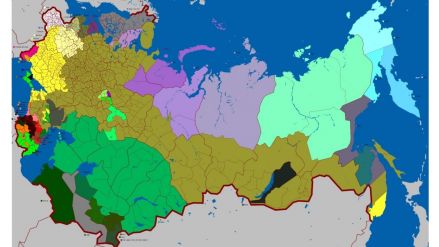
In the 1920s after initially taking control in the country, Moscow then accused Ukrainians of attempting to wrench the Far East from the Soviet Union.
see more
In recent months, France has really won one battle – the diplomatic one. For Paris sought the internationalisation of the Barkhane mission. Successfully. Several hundred soldiers from Denmark, Estonia, the Czech Republic and Sweden have arrived in Mali. The ruling junta in Mali gave them a cold reception.
Hungary, Portugal, Norway, Romania and Lithuania were also planning to send troops there this year, but their missions are now open to doubt. “We have learned that the transitional government of Mali, or the generals responsible for the coup, made a public statement last night in which they reiterated that Denmark is not welcome in Mali. We, of course, will not tolerate this, which is why we have decided to withdraw our troops home.” – announced Danish Foreign Minister Jeppe Kofod in late January. The decision to withdraw troops was also made by Sweden.
France reacted harshly to these news. French Foreign Minister Jean-Yves Le Drian criticised the junta for being “irresponsible” and described it as an “illegitimate, power-hungry regime” and warned that “Paris will hold it responsible.”
Relations between Paris and Bamako are at their worst in years. When the country suffered a coup in May 2021, Mali’s new military authorities, led by Assi Goita, conveyed to France that it should stop interfering in the region’s affairs and “keep its colonial ambitions to itself.”
At the moment, the putschists de facto control only 30% of Mali’s territory; the rest of the country is under jihadist rule. External aid is necessary for the country to function, but the junta does not want it. One can of course understand the desire for sovereignty and the aversion to the former metropolis, but the point is that terrorism is a transnational issue and not just a domestic problem for Bamako.
As I finish writing this text, the Mali authorities have declared the French ambassador to the country persona non grata. What will happen next in the Sahel? Everything is going in the worst possible direction.
The Russian factor
The pieces of the Sahel puzzle are slowly beginning to fit together. The resentment towards France and the rejection of aid from EU countries are coinciding with growing sympathies towards Russia, which is already muscling into more countries.
For several weeks it has been said that Mali has been in talks with mercenaries from the “private” Wagner Group. “Private” because it is actually controlled by military intelligence and headed by retired GRU lieutenant colonel Dmitry Utkin. Wagner Group has been an unofficial “armed wing of Moscow” for years. However, some claim that Utkin’s thugs are already in Mali.
The coup in Burkina Faso also had pro-Russian overtones from the start. Russian flags could be seen in the streets, where people turned up with slogans in support of the military junta; there were voices calling for rapprochement with Russia or even encouraging direct Russian involvement in the country. There was also talk of expelling the French and cutting ties with Paris.
Could it be that Russia has thought back on Africa? Perhaps Moscow no longer wishes to passively watch the Sino-American rivalry in the Dark Continent. Its interest in Africa has a long history, which began during the Cold War. After the collapse of the Soviet Union, the Russians abandoned Africa for a while. For the past few years they have been back at it, in their own style – deploying mercenaries and “military instructors”.
In the last two years, Russia has confirmed that it intends to build several military bases: in Madagascar, Sudan, Egypt, Eritrea, Mozambique and the Central African Republic (CAR).
In August 2018, Russia and CAR concluded an agreement on military cooperation. While being one of the poorest countries in the world, Côte d’Ivoire is also rich in resources and lies in the heart of Africa, making it a convenient location for a military base facilitating access to other countries in the region.
Russian troops arrived in CAR in December 2020 – officially at the invitation of the country’s authorities. Although Russia has denied sending troops to Africa, the fact remains that the Wagner Group was there.
A9
There has been a thaw in the CAR-Russia relations. So much so that last year the Ministry of Education announced that the study of Russian may become compulsory for students at Bangui University, and it may even be the “leading” language. Although French is the official language in the Central African Republic, it has recently become increasingly unpopular. In fact, President Faustin-Archange Toudéry accuses France of giving unofficial support to CAR’s former president, François Bozizé, which has led to a rebellion in the country.
However, the Russian military presence brings along suffering for ordinary people. In May last year, media reports emerged about Russian crimes in CAR. According to French investigators and a group of UN personnel, the Wagner Group carried out robberies, looting, rapes, and murdered civilians.
According to official figures from the Kremlin, there are currently 500 military advisers in CAR who are not involved in the fighting. In reality, there are around 2000 well-trained soldiers there. However, any attempt to get to the truth about the Russian presence in Africa ends tragically. Three independent Russian journalists who were investigating the subject of financial links between the Kremlin and the Central African Republic were murdered in 2018.
– Anna Szczepańska
– translated by Jan Ziętara
